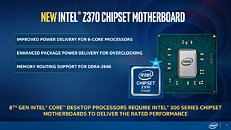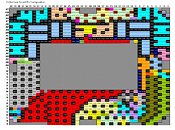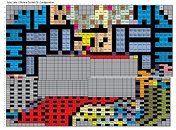Wednesday, October 18th 2017

ASUS Confirms Z270 Platform Could be Compatible with Intel Coffee Lake CPUs
In an interview with Bit-tech, ASUS ROG motherboard product manager Andrew Wu has let the proverbial cat out of the bag: apparently, compatibility of Z270 boards with Coffee Lake processors wouldn't have been impossible after all. When asked why the new Coffee Lake CPUs aren't compatible with the previously released Z270 platform, Andrew Wu explained that it" (...) depends on Intel's decision." Andrew Wu also went on to mention that Intel's stated power delivery reasons don't "make much difference", and that ASUS themselves could make their Z270 motherboards compatible with Coffee Lake. For that, however, they'd need "(...) an upgrade from the ME [Management Engine] and a BIOS update", for which "Intel somehow has locked the compatibility."
It seems all of that extra "pin-count" doesn't really matter in the grand scheme of the current Coffee Lake lineup with up to six core processors - the CPU socket and platform as designed with Z270 would have been able to handle the increased core counts and power loads. The question gets murkier with Intel's ability to release an 8-core CPU to the Z370 platform though - that particular amount of cores might indeed prove to be too much for Z270's power delivery. Making an educated guess, it would seem that Intel could have allowed for Coffee Lake compatibility on Z270 motherboards on CPUs up to 6 cores, but would need the new revisions on the Z370 platform to allow for operation of 8-core Coffee Lake chips.Naturally, if Intel were to allow backwards compatibility, that would eat into sales of current-gen Z370 boards, so the company decided to increase the Z370 platform's attractiveness by locking all Coffee Lake processors behind it. It's not much of a platform sale point to say that it will be eventually compatible with unannounced 8-core CPUs. And let's be honest: ASUS and all other motherboard manufacturers probably love this game themselves, since they do get to sell more motherboards this way.
Source:
Bit-tech
It seems all of that extra "pin-count" doesn't really matter in the grand scheme of the current Coffee Lake lineup with up to six core processors - the CPU socket and platform as designed with Z270 would have been able to handle the increased core counts and power loads. The question gets murkier with Intel's ability to release an 8-core CPU to the Z370 platform though - that particular amount of cores might indeed prove to be too much for Z270's power delivery. Making an educated guess, it would seem that Intel could have allowed for Coffee Lake compatibility on Z270 motherboards on CPUs up to 6 cores, but would need the new revisions on the Z370 platform to allow for operation of 8-core Coffee Lake chips.Naturally, if Intel were to allow backwards compatibility, that would eat into sales of current-gen Z370 boards, so the company decided to increase the Z370 platform's attractiveness by locking all Coffee Lake processors behind it. It's not much of a platform sale point to say that it will be eventually compatible with unannounced 8-core CPUs. And let's be honest: ASUS and all other motherboard manufacturers probably love this game themselves, since they do get to sell more motherboards this way.



72 Comments on ASUS Confirms Z270 Platform Could be Compatible with Intel Coffee Lake CPUs
Intel was quick to pull the plug on that. Way to ruin everyone's fun.
Sockel 1151 -> INTEL Desktop -> Prozessoren (CPU) -> Hardware | Mindfactory.de - Hardware, Notebooks
Now, if I go and add the numbers from all other Kaby Lake models, i7 7700K sales will be much less than 50% of the total, but in any case it is the top selling product. So there are many people willing to pay close to $350-$400 for a processor and two extra cores is a good excuse to pay $50 more. At least in markets such as the German and probably the American where people does have a good income. OK, in Greece i7 7700K will sell much less. 10 years ago politicians where calling a wage of 700 euros a disgrace, today is a pre-election promise and commitment.
The only thing that keeps most of those from selling their Kaby Lake and rushing to a 6 core 12 threads Coffee Lake, is the lack of availability of Coffee Lake models. People who buy expensive processors and keep upgrading often, rush to sell their platform before it loses more value.
Lets not forget that AMD has already said that the am4 socket will be compatible through 2020 and the Zen 3 platform.
I'm curious why everyone is up in arms about this. It's not like the feature set of a 370 is so amazingly better then a 270 or 170, and the CPUs themselves are not a huge jump in per core performance anyway. Sure, you can get more cores, but most wanting more cores have HDET or jumped to AMD already.
Given how long CPUs and mobos last these days, why be upset over not being able to use a new one? Heck, why upgrade already? Unless you are on sandy bridge, this doesnt do much more. Im still on ivy, waiting for something to convince me to upgrade. Nothing is unplayable, I have PCIE 3.0, USB 3.0, and SATA III. I suppose M.2, but the speed is almost worthless over a good sata III drive in real world benches, so it doesnt make a huge difference to me.
Watch it. It's totally worth the time.
I've been repeating this to anyone who have said "the VRMs on some motherboards aren't enough for CFL" when it was made public that the old 1151 doesn't support CFL. I'm pretty sure that my Z170 Pro Gaming for example wouldn't have any problem running a CFL, even when overclocked.
TL;DW
en.wikipedia.org/wiki/Advanced_Micro_Devices#Litigation_with_Intel
en.wikipedia.org/wiki/Intel#Anti-competitive_allegations_and_litigation_.282005.E2.80.932009.29
AdoredTV has a clearly biased presentation, he is misleading and gets some facts wrong. Plus, a whole lot of what he says is irrelevant.
The issue with Coffee Lake is the number of power pins in the socket itself. There aren't enough in the old 1151 socket to safely provide the power needed for the 6-core Coffee Lake. Does no one remember the burnt pins/pads problem socket 1156 had? Intel learned from their mistake and is making sure there are plenty of pins for power delivery. Yes, you could probably technically get away with the lower number of pins on the old 1151, but when you pass more current through something it gets hotter. Possibly hot enough to start melting/burning things.
When you pass too much currant through too few of pins, this happens: